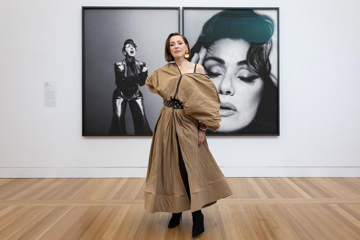How A Life-changing Diagnosis Influenced Their Latest Album
"It was a fairly invasive surgery, so had I just jumped back on the drums and started playing, like nothing had happened, I could've probably re-injured myself."


In 2014, Black Rebel Motorcycle Club drummer Leah Shapiro noticed a growing array of strange symptoms: dizziness, tingling in her hands, a loss of coordination. Tests revealed that she had structural abnormalities in her brain called Chiari malformations, that required immediate surgery. The band (Shapiro, guitarist/vocalist Pete Hayes, bassist/vocalist Robert Levon Been) cancelled shows, and turned their focus to Shapiro's health. Their fans raised money online to foot her medical bills. And, most amazingly, her neurosurgeon turned out to be a Black Rebel Motorcycle Club fan.
"When I walked into his office for the first time, I was with Pete," Shapiro recounts. "After I said I was a musician, I think [my surgeon] recognised Pete. He was a huge music fan. He loves Nine Inch Nails, Queens Of The Stone Age, and Black Rebel Motorcycle Club, obviously."
Knowing their music wasn't just gratifying, but fortunate. Shapiro's surgeon put together a rehab plan for her return to the kit, not only outlining basics — starting only with five-minute sessions, working up to ten minutes, holding off on the kickdrum — but working out a schedule of what Black Rebel Motorcycle Club songs she could play, and when. "I was going to physical therapy every day. I had to slowly get used to moving my upper-body a lot," Shapiro explains. "It was a fairly invasive surgery, so had I just jumped back on the drums and started playing, like nothing had happened, I could've probably re-injured myself."
Shapiro had played drums since she was a teenager growing up in Aarhus, Denmark. Her initial childhood love was for horse riding and competitive showjumping, but she was also, always, a "wanderer" at heart. Drums became her passport unto the world: she went to music schools in Nottingham, Boston, and New York. She met the Black Rebel Motorcycle Club guys playing in Dead Combo, and serving as touring drummer for The Raveonettes. She began playing with Black Rebel Motorcycle Club in 2008, replacing original drummer Nick Jago; joining a band that'd already been around for a decade.
Don't miss a beat with our FREE daily newsletter
"My advice to anyone who was going to do that," Shapiro says, with a laugh, "first of all: learn the music, learn the music well, so you don't walk in not knowing what you're doing. That aside — which should be pretty obvious — I think it's important to observe the dynamic of how the band runs. Pay attention to what other people are doing. Be aware of the strengths you have, and see how you can use those strengths to fill in where other people don't have them."
While Shapiro believes that she, Hayes, and Been "instantly" had "that unspoken connection", it took her a while to feel as if the band was her own. Her first recordings were for the sixth Black Rebel Motorcycle Club LP, 2010's Beat The Devil's Tattoo, but it was only on 2013's Specter At The Feast that she "felt more comfortable vocalising my contributions to the writing".
It's taken Black Rebel Motorcycle Club five years to follow-up Specter At The Feast, with their long-awaited eighth LP, Wrong Creatures, recently released. Speaking with the album freshly finished, Shapiro isn't sure how, exactly, to talk about it, feeling too close to the grind of recording. "My brain is very much still fried," she says; though, she's quick to point out, she's talking about the endless days working, not the after-effects of surgery.
That surgery is one of the reasons, of course, it's taken the band five years between albums. But it's not the only reason. "The culture of music is to churn out a lot, and churn it out fast, but we chose to not go by what's recommended," Shapiro says. "I don't want to just crank out a record and throw it out there."
Part of taking your time, Shapiro says, is allowing the music to take its own form. "You can make the best plan in the world, but when you sit down to actually make the music, it never works out in the way that your brain envisioned it. A lot of times what we do is just pick up our instruments and follow their lead. Getting your ego out of the way is helpful, that way you can let the music just be what it wants to be."







